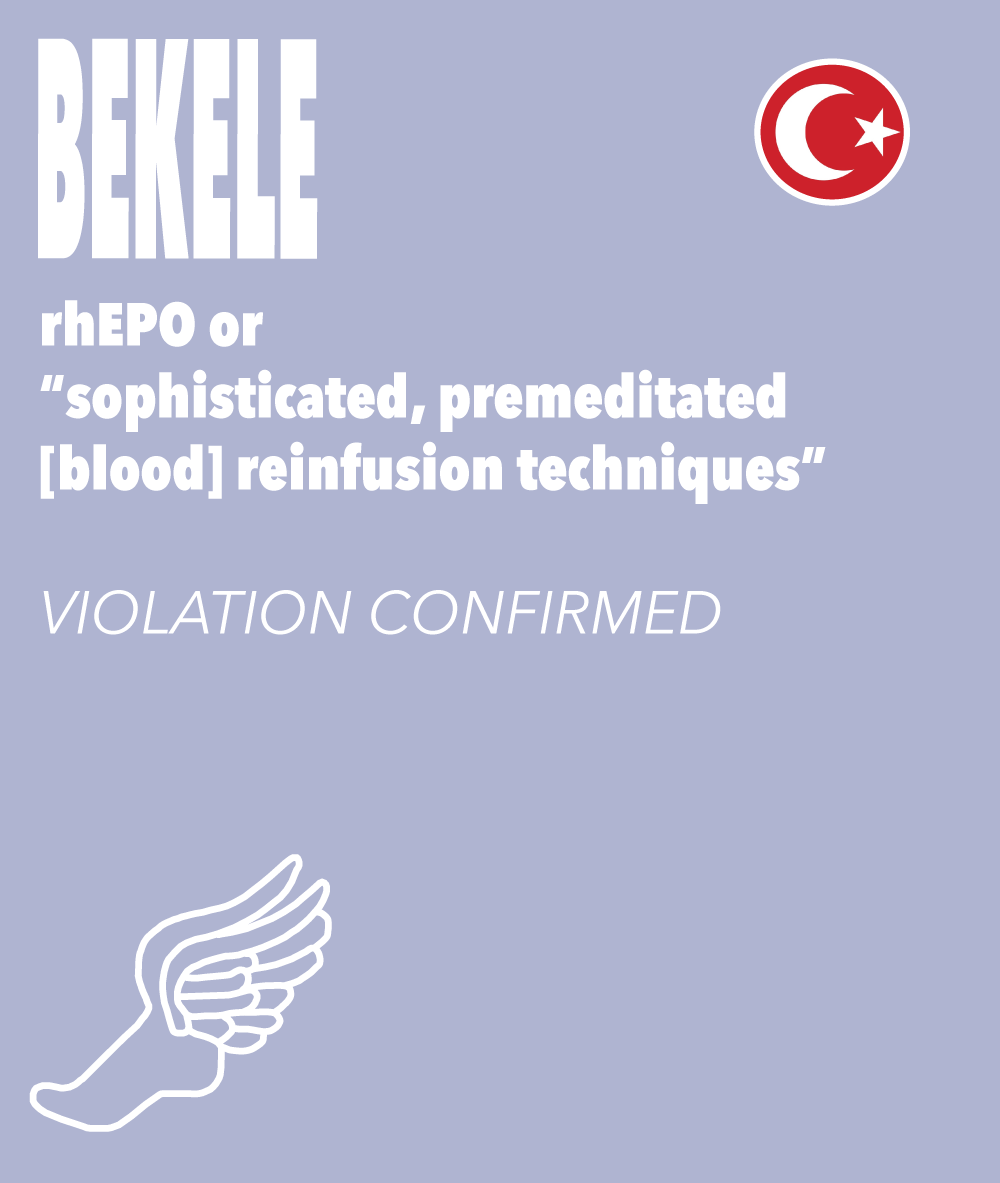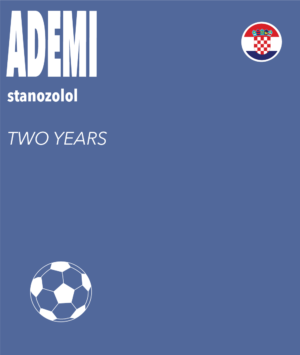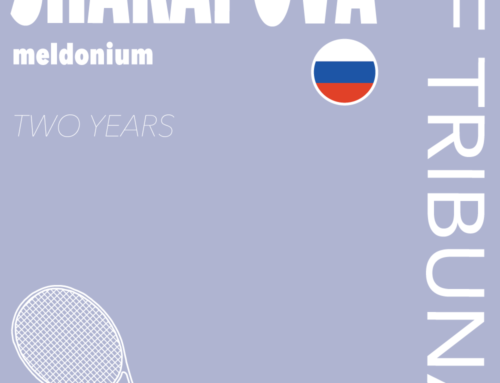Download the Bekele Blog Post HERE
CAS Award:
Alemitu Bekele Degfa v. Turkish Athletics Federation & IAAF, CAS 2013/A/3080, March 14, 2014.
In this award, recently published in the CAS bulletin, Alemitu Bekele Degfa – a long-distance runner of Turkish Nationality and Ethiopian origin – was found to have committed an anti-doping violation with aggravating circumstances. The violation was established on the basis of abnormal values indicative of blood doping in samples taken as part of the International Association of Athletics Federations’ (“IAAF”) Athlete Biological Passport (“ABP”) program. The CAS panel accepted the view of the IAAF’s two experts that the values could not be physiologically explained and could “only be achieved through an artificial increase in the number of circulating red blood cells.” The experts proposed two hypotheses that could explain these abnormalities: either the Use of recombinant human EPO (rhEPO) or through “the application of red cells through blood transfusion.”
Since the runner only challenged the length of the period of Ineligibility, the brunt of the CAS panel’s discussion focused on this issue in light of the evidence supporting the anti-doping rule violation. In particular, the CAS panel decided that the suspicious blood values existing in two of Alemitu Bekele’s samples just before key events were indicative of a “doping plan or scheme” (though likely not as sophisticated as in other cases previously brought before CAS), and thus the aggravating circumstances provision (Article 10.6 of the 2009 WADC) appropriately applied in this case. However, the four-year period of Ineligibility that Alemitu Bekele was given by the initial disciplinary panel (the maximum penalty available for aggravating circumstances) was considered unduly harsh under the circumstances and therefore reduced.
As part of its analysis, the CAS panel dismissed the notion that blood doping should automatically draw a four-year period of Ineligibility, finding instead that the specific circumstances of each case must be examined. In the particular matter, the CAS panel decided that a period of Ineligibility of two years and nine months was warranted.
ATHLETE BIOLOGICAL PASSPORT PROGRAM
This award represents one in a series of ABP cases – mostly in cycling – brought before CAS panels since the introduction of ABP programs by various major international federations under the era of the 2009 Code. Compared to “traditional” means, the ABP represents a novel paradigm in anti-doping, with various features that make its integration into the legal WADC regime delicate. In particular,
- The ABP searches for anomalies pointing to the effects of doping on the Athlete’s biological parameters, rather than an Adverse Analytical Finding reporting the presence of a Prohibited Substance or evidence of a Prohibited Method;
- The ABP is based on longitudinal profiling – sequential measurement of biological parameters – rather than isolated Testing; and
- The ABP seeks to develop an individual reference range for values that should be considered “normal” in each Athlete, rather than to rely on population-based values.
AGGRAVATING CIRCUMSTANCES IN ABP CASES
In previous cases involving ABP programs, the discussion generally revolved around the reliability of the ABP as an evidentiary tool and/or the interpretation of the profiles in a given matter (see e.g. Caucchioli v. CONI (TAS 2010/A/2178) and UCI v. Valjavec (CAS 2010/A/2235)).
In the Bekele case, the issue at stake was formally limited to the length of the period of Ineligibility, but the analysis goes into more fundamental questions about the significance of an established violation based on an Adverse Passport Finding in blood profiles when it comes to drawing inferences for the Athlete’s guilt. Conceding that violations for blood doping are by their very nature, “repetitive and sophisticated,” the CAS panel nevertheless rejected the conclusion that blood doping should automatically draw the maximum length sanction of four years under the aggravating circumstances provision. The CAS panel compared the Bekele case, which included two established instances of blood manipulation in a single year, to the Kokkinariou case (CAS 2012/A/2773), where the Athlete “whose career over five or six years appears to have been built on blood doping” was involved in a much longer scheme and was assigned the maximum sanction available. Noting a difference in the Athletes’ respective levels of fault, the CAS panel declined to assign the maximum penalty in the Bekele case. In the eyes of the CAS panel, finding otherwise would suggest an almost automatic four-year period of Ineligibility for blood doping, when the rules themselves contain no such provision. Rather, the Bekele panel considered that “each case has to be considered on its own merits and in the particular circumstances of this case, taking account of the gravity of the aggravating circumstances which have been established.” [1]
IMPLICATIONS UNDER THE 2015 CODE
This case highlights one of the key differences between the sanctioning regimes under the 2009 and under the 2015 Code – namely, the inflexibility of the four-year period of Ineligibility under the latter. In the Bekele case, which was decided under the 2009 Code, the CAS panel had the flexibility to distinguish a doping plan or scheme that involved relatively few instances from a sophisticated conspiracy that transpired over the course of multiple years and the discretion to tailor the sanction accordingly. The 2015 Code allows for no such flexibility. Instead it instructs hearing panels to assign a four-year period of Ineligibility for all “intentional” violations, despite any relative variation in the level of fault involved.
In the Bekele case, the panel emphasized that applying an “automatic” four-year period of Ineligibility for cases involving blood doping would not be in line with the rules. Rather, it emphasized that the circumstances of the case must be examined, regardless of the nature of the substance involved. Technically, the panel’s reasoning is still valid underneath the 2015 Code, but a four-year period of Ineligibility for blood doping cases will likely become more commonplace. The 2015 Code still calls for a consideration of the circumstances of the case when evaluating an Athlete’s level of Fault, and only assigns a four-year period of Ineligibility for “intentional” violations. The concept of “intentional” under the new Code arguably only applies to those violations exhibiting a high-degree of Fault, or using the language from the Code, for those who “cheat.” In other words, even for Prohibited Methods such as blood doping, the hearing panel would still need to address the circumstances of a particular case to ensure that a “knowing” violation properly corresponds to an “intentional” violation in the sense of the 2015 Code. As a practical matter, however, it is difficult to imagine a blood-doping case that would not also include willful conduct and “cheating.” Thus, even if four-year periods of Ineligibility are still not “automatic” sanctions for cases involving blood doping, they will be easier to square with the 2015 Code.
It will be interesting to see how future CAS panels handle the inflexibility in the new regime for sanctioning “intentional” violations, especially given the predicted growth in the use of the ABP tool in anti-doping. For example, a new steroidal module was added in 2014 to the ABP program and enshrined in the WADA ABP Guidelines. The steroidal module establishes longitudinal profiles on the basis of urine samples and targets, in particular, the use of anabolic steroids. To the best of our knowledge, the steroidal module has so far been used predominantly for its screening and targeting components and not as a direct basis for establishing an anti-doping rule violation. That said, this prospect certainly exists and would trigger new questions. Future violations brought on the basis of the steroidal module, or even the ABP generally (i.e. without an Adverse Analytical Finding), will inevitably lead future panels to elaborate further on the modalities for sanctioning “intentional” violations in this context, especially given the fairly uniform, longer bans they could draw.
[1] In the more recent Lallukka case (CAS 2014/A/3488), the panel took a similar approach to evaluating aggravating circumstances for a violation involving human growth hormone, stating that the applicable rule “does not differentiate between various forms of first offence or suggest that doping with hGH attracts ratione materiae a higher sanction than the presence of another prohibited substance. It is the circumstances of the offence, not the offence itself which may aggravate.” (para. 130)
(copyright February 3, 2015)




Leave A Comment